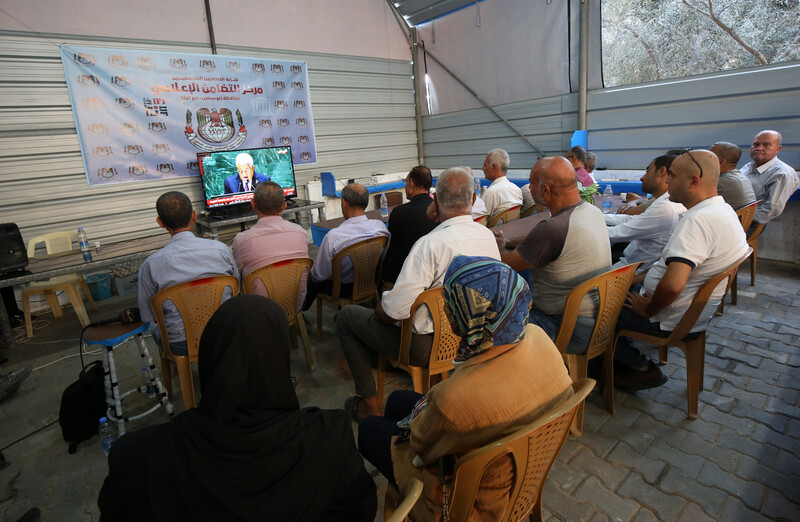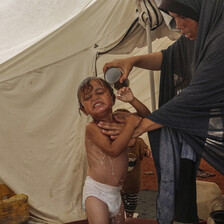The Electronic Intifada 30 October 2024

Journalists watch a monitor in Deir al-Balah in the central Gaza Strip in September. Gaza has become the world’s most dangerous place for journalists with 182 killed since last October.
APA imagesAs is the case for everyone else in Gaza, life for journalists has changed beyond recognition over a year of genocide.
I and my family have been forcibly displaced nine times and forced to search for safe places or places close to water and food sources or distribution centers to protect my children and provide for their basic needs.
I am now settled in a shelter west of Deir al-Balah in the central Gaza Strip with my family of seven.
A typical day is harsh and routine.
At 7 a.m, I wake up sweating because of the heat of the tent.
I start my day by doing household chores such as packing our bedding and putting it aside inside the tent.
Sometimes, I put the bedding outside to expose it to the sun to get rid of moths, lice, ants and other small insects.
At 8, neighbors and I knead flour for bread and then bake it in a clay oven that we light using dry tree branches.
I bake about 20 pockets of Arabic pita bread daily, enough to meet my family’s needs.
By 9, I am preparing breakfast for my family. The options are very limited. All I have is cheese and zaatar. One day I will serve cheese to my children to go with the bread; the next I give them zaatar.
At 10, I help my husband fill gallons of water from a water supply station near our camp to use for washing clothes and dishes.
A donkey cart arrives shortly afterward with fresh drinking water from the local desalination station. Most displaced people, including my family, rely on such carts.
The displaced pay for this water, just as they did before the war, but now the price has quadrupled. Before the war, filling a 20 liter container cost only $0.3, but today it has risen to $1.2 due to the increased cost of desalination at local stations.
Worse still, we can’t be sure that this water is clean as Oxfam reported in July, in detailing how Israel’s military has been wreaking havoc on Gaza’s water supply.
Israel cut the water supply to the territory on 9 October 2023, and imported bottled drinking water is hard to secure. Even that has doubled in price.
Work
I leave my lifeline to the world, my cell phone, at a shop near the camp to be charged. The store owner has solar panels to provide electricity.
At 11, I bid my children goodbye and walk about 1.25 miles to a place where I can use the internet to do my work.
The internet is vital for my work and to follow the events taking place during the war. I have not watched television in more than a year.
I usually focus on stories that reflect the reality that is happening around me, and whose details I live myself, such as the challenges of living in a tent, of repeated displacements, and the burden of providing water and food for children.
When I start researching a story, I usually begin by interviewing displaced people. With 1.9 million out of Gaza’s 2.3 million population homeless, everyone’s story is worth telling.
I look for people in my vicinity, since moving around in Gaza is both difficult and dangerous. I also go to other shelters to learn about their experiences and to focus on the human dimension of genocide.
If I need to speak to analysts or experts in certain fields, I will try to contact them by phone or online. With networks unstable and phones constantly out of charge, this can be time consuming.
I try to stay near my children, but sometimes I have to go to locations to report, to bear witness and to speak to people, particularly doctors, who are constantly working and difficult to contact in other ways.
I usually catch a ride with an animal-drawn cart if I need to travel. With Israel preventing fuel from entering Gaza, there are few cars on the roads.
Safety
I am aware that my work puts my safety and even the safety of my family at risk.
By the latest count from local authorities, Israel has killed 182 Palestinain journalists since last October.
I notice that my neighbors in the shelter are worried about the presence of a female journalist among them. This could also put their lives in danger.
Sometimes, like now, I therefore choose to write anonymously to avoid this danger.
But no one is safe in Gaza, no matter what you do. On 10 October I was working when the Israeli military bombed a school near our shelter, killing at least 28, including many children.
I felt indescribable fear and ran back to our tent to check on my children.
I spend about five hours a day working, away from my children. While writing about the suffering of the displaced, my heart and thoughts are always with them.
Survival
I usually return to our tent at 4 p.m. to prepare a late lunch, which is most often very basic, such as tomato and potato salads, or rice, if available.
Friday is a special day, as my husband buys chicken, a rare treat.
We face great difficulty cooking. Israel continues to obstruct the delivery of humanitarian aid across Gaza, and that affects the availability of cooking gas. We usually have to rely on firewood.
In the north of Gaza, cooking gas is not allowed at all because of the Israeli blockade which I think is implemented with the aim of starving the population and forcing Palestinians to move south.
At five, I do some housework. I have to wash clothes by hand, as there is no electricity to operate any machines, and I wash the dishes using sand instead of scarce water. Locally manufactured cleaning products are of poor quality due to the lack of good raw materials.
By seven in the evening, I am with my children and husband talking about the day. Sometimes the session is full of jokes and laughter. At other times, it is filled with tears over the intensity of the suffering around us.
At 9 p.m. we are all in bed getting the rest needed for another day filled with the challenge of living under the constant threat of annihilation.
Another day is over.
We survived.
The writer is working under an assumed name for safety considerations.


